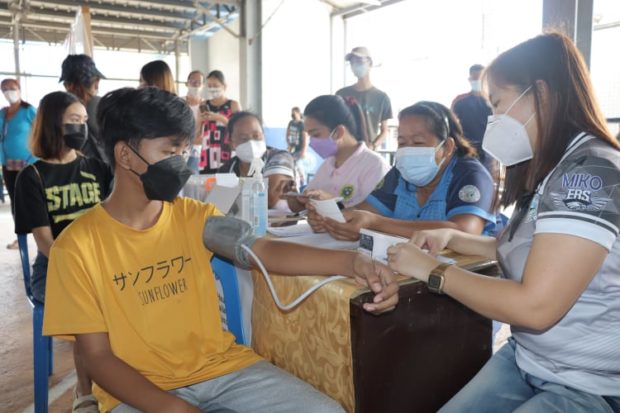
Barangay health workers monitor children before they get their COVID-19 shots at the Municipal Vaccination Operation Center in San Marcelino town, Zambales province. This photo was taken in January 2022. (Photo courtesy of San Marcelino Public Information Office)
MANILA, Philippines — As the rollout of pediatric vaccination for kids age 5 to 11 begins today, Monday, the Department of Health (DOH) has strongly encouraged parents to have their children vaccinated against COVID-19.
“Vaccination will protect them from severe forms of COVID-19 disease and provide an additional layer of protection as they begin face-to-face schooling soon,” the DOH said on Sunday.
Health Undersecretary Myrna Cabotaje also reiterated that vaccination is not mandatory.
“Parents will give consent. We will also explain to the child what would happen during vaccination, what we will give them, the benefits of the vaccine and its side effects,” Cabotaje said in an interview with radio station dzMM on Sunday.
Globally, the DOH said more than 8.7 million children have been vaccinated against COVID-19 and “there have been no reports of deaths attributable to vaccines.”
It said 97.5 percent of those vaccinated did not experience side effects, 2.4 percent experienced mild side effects while 0.00013 percent experienced serious adverse events such as myocarditis or pericarditis, but all fully recovered.
According to the DOH, 77 percent of the target population of 12- to 17-year old adolescents have been vaccinated since the rollout in October.
Of the 8.8 million from this age group who have received at least one dose, the Food and Drug Administration (FDA) reported that 99 percent of them “did not report feeling any symptoms after vaccination,” while 0.03 percent experienced “mild reactions such as dizziness, pain in the injection site and headache” that passed within two to three days.
“Reported cases of myocarditis and pericarditis are currently being assessed … if indeed caused by vaccines,” the DOH added.
Hesitation
The clarification followed concerns of parents and interested groups on the immunization of minors, with some individuals filing a petition to contest the clause of the DOH policy that gives the government the authority to provide consent to a willing minor.
Cricket Chen, a doctor specializing in anthroposophic medicine, or “anthromedics,” warned about the potential impact of the COVID-19 vaccine on children’s health in the future.
Anthromedics is an integrative branch of medicine that views human beings as consisting of body, soul and spirit and these factors serve as the basis for diagnosis and treatment.
“What I learned from anthroposophic medicine is that in the first seven years of life, our physical bodies [are still] developing the organs,” Chen said during a virtual forum of Alliance of Filipinos for Freedom and Informed Choice (AFFIC).
“If we inject foreign matter or material into a child, it can have an impact on the child’s health in the future,” she added.
Bingbing Gardose, also an anthroposophic physician, said that if the vaccines were given at an early stage, the immune system of the kids would develop a specific immunity to certain substances.
“It’s like asking the immune system of the child to work in a specific way and problems could also arise with that,” she claimed.
AFFIC said in a statement that the inoculation of kids was “a grave act of child rights violation because vaccinating children for COVID-19 exposes them to risks that far outweigh the hoped-for benefit.”
The alliance claimed it was not against vaccination itself, “but we are strongly against the mandatory COVID vaccination especially on our children due to its experimental nature.”
Voluntary
But as Cabotaje said, the vaccination was not mandatory as she assured the public that the vaccines were proven safe and effective.
“It has been proven abroad and we’re not the ones to start the [pediatric vaccination]. It has begun in many countries, including the United States, France, Malaysia, Singapore and China,” she said.
The approval of the Philippine FDA on the emergency use authorization of Pfizer was also another assurance of the vaccine’s safety, she added.
She also clarified that what the parent and child would sign at the vaccination site were not waivers but consent forms.
But in case anything happens to the child, the government, through the Philippine Health Insurance Corp., can pay for a certain percentage of the cost and provide benefits if the problem is traced to the vaccine.
“There will be an assessment at the regional and national level and there is what we call the indemnification,” she said.
Under Republic Act No. 11525, or the COVID-19 Vaccination Program Act of 2021, a P500-million indemnity fund is allocated for the compensation of individuals who might experience adverse events following immunization.
Important policy
Meanwhile, Education Secretary Leonor Briones said during a press conference on Friday that she had been receiving letters urging the Department of Education (DepEd) to stop the pediatric vaccination.
Briones said that she would refer the matter to the DOH since it was a health issue.
“The parents have a choice. If they don’t want [their children to get vaccinated], they don’t have to because the vaccination is voluntary,” she said.
“For those who have hesitation, they have a choice. But they cannot participate in face-to-face [classes] because that for us is a very important policy step,” Briones said.
She noted the high level of acceptance from stakeholders, adding that the DepEd did not see a single case of COVID-19 infection during the pilot implementation of limited in-person classes.
READ: Vax drive for kids reset; petition wants it stopped